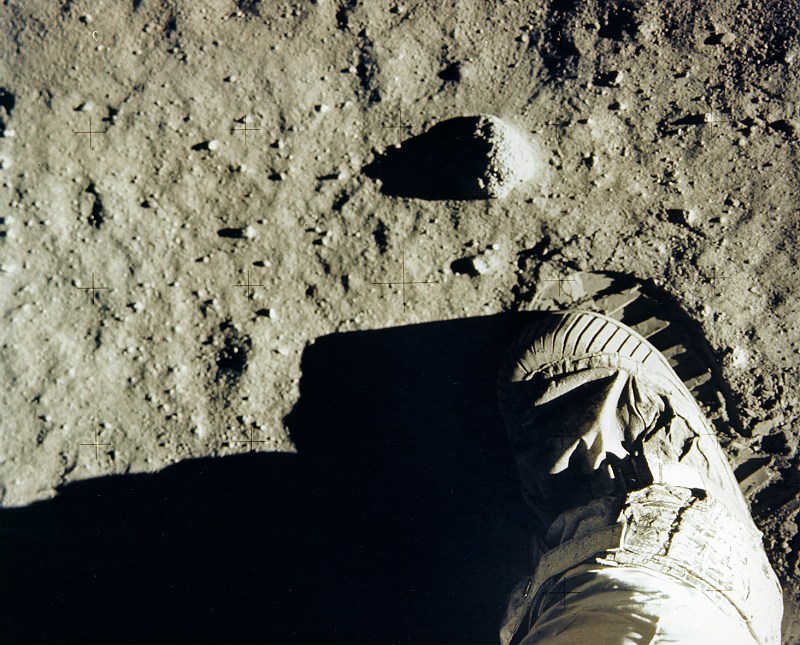It was such a big event that it pushed me into buying a television set. I had never owned one. I had no interest in what they showed on television—I was too busy reading, and writing—and that was how I missed out on being a Star Trek writer, because I knew nothing about television and simply shrugged when Gene Roddenberry showed up at the s-f convention in 1966 looking for writers. But a moon voyage, shown live on television—I could hardly allow myself to miss that!
Thus in the fall of 1968, right after moving back into my New York house after an interminable period of exile that was brought upon me by a fire, I bought my first TV, and on a chilly night during Christmas week, made even chillier by the white glare of the moon on the screen, I watched Anders, Borman, and Lovell perform the first manned lunar orbital mission. And then came the long wait for the lunar landing itself, scheduled for the following summer.
Moon Landing Day—a Sunday, it was, and I remember it as pretty warm and humid, as July days in New York usually tend to be—we gathered before the television set to watch Apollo’s final approach to the lunar surface. (And who ever imagined that we would watch the event as it happened, on television, in our homes?) “Two thousand feet,” Aldrin said, and Houston said, “Eagle looking great. You’re GO.” With the incredible crawl-line at the bottom of the screen saying something like LIVE TRANSMISSION FROM THE MOON. Followed by long anxious moments as the landing vehicle drifted over the barren surface, moving between craters and a boulder field—I am looking at the MOON, I told myself, I am looking at the MOON—and then came the great plume of dust as touchdown approached, and then the words, the unforgettable words, “Houston, Tranquility Base here. The Eagle has landed.” Simply typing them now, forty years later, moistens my eyes.
Naively I thought that the hatch would now open, Neil Armstrong would come scrambling down the ladder, and within moments we would behold the spectacle of a human being walking on the moon. Well, no, there was all sorts of preliminary stuff to do first, hours of it, and throughout the rest of that afternoon we hovered impatiently near the TV, toting a transistor radio around with us for bulletins whenever we had to be elsewhere. It became clear after a time that the actual moonwalk would not begin until far into the evening, and we went downstairs for a hasty dinner, and went back up to the TV, and waited, and waited, and waited, and somewhere around eleven o’clock, more or less my bedtime then, came word that Armstrong was about to emerge, and there was that foot on the ladder, and the dimly seen spidery figure descending, and then, step by step, the descent to the lunar surface, the arrival on it, the utterance of the somewhat bungled and stagy official First Words.
I could hardly sleep that night. I kept seeing those clouds of lunar dust as the landing was achieved, and that figure clambering down the ladder, and again and again I heard those words, “The Eagle has landed,” and I could envision Luna City a-building a decade or two ahead, and the first lunar tourist trips, and then the first manned voyage to Mars somewhere around 1992, with all the rest of the universe just beyond. Who could have known that the beginning of all that was also the end, that all the glory of the space adventure was front-loaded, that we would attempt the journey, and succeed, and then stop? No one saw that coming. No one. Least of all we poor shortsighted prophets of the future, the science-fiction writers.
Robert Silverberg is an American author and editor of science fiction. His incredibly prolific bibliography includes dozens of novels, non-fiction books, short stories, and collections. He is the winner of multiple Hugo and Nebula awards, and has the distinction of winning major awards in each of six decades (from the 1950s to the 2000s).










